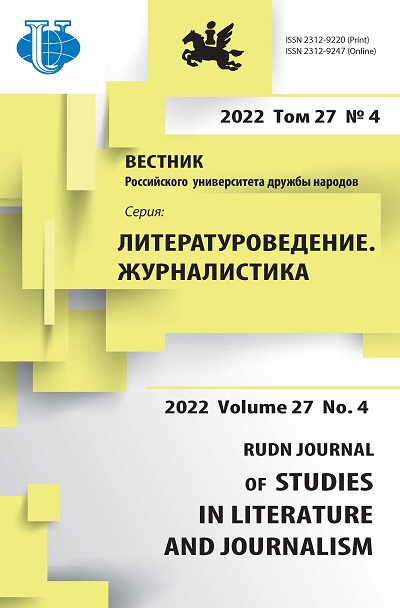American youth slang in Russian media
- Authors: Baranova E.A.1, Lavrova K.A.1, Chebanenko V.V.2
-
Affiliations:
- Russian State Social University
- Peoples’ Friendship University of Russia (RUDN University)
- Issue: Vol 27, No 4 (2022)
- Pages: 775-787
- Section: JOURNALISM
- URL: https://journals.rudn.ru/literary-criticism/article/view/33289
- DOI: https://doi.org/10.22363/2312-9220-2022-27-4-775-787
- ID: 33289
Cite item
Full Text
Abstract
The formation of the global media space contributes to the active penetration of a different, non-Russian, culture in the domestic media, with one or another broadcast lifestyle having a great impact on the behaviour of young people, shaping, among other things, their oral and written speech through slang. Slang is a rather actively developing lexical layer, new slang units appear in the language every day, they reflect not only cultural values, priorities and aspirations of those who use them, but also demonstrate specific ways of shaping thinking. The study of American slang words and their influence on contemporary Russian youth is especially relevant in the context of information warfare. The authors examine slang words that are reflected in the Russian-language media and social networks, as well as the peculiarities of their influence on the cultural values of adolescents. The materials with slang words, posted from January 2019 to February 2022 in social networks TikTok, VKontakte, on the youth Internet portals QRU, Spletnik, Elle Girl were selected by the method of continuous sampling. The authors reveal their meaning in the context of the analysed publications and come to the conclusion that the active use of such slang units as, for example, crash, cheater, flex, ROFL indicates the priority of idleness in the leisure time of young people. At the same time, teenagers show a lack of interest in cultural leisure: there are no slang expressions for such activities as going to a museum, sightseeing, theatre, concert hall or library.
Keywords
About the authors
Ekaterina A. Baranova
Russian State Social University
Author for correspondence.
Email: kat-journ@yandex.ru
ORCID iD: 0000-0003-1794-9936
Doctor of Philology, Professor of the Department of Qualimetry, Communication Management and Relationship Management
4 Vilgelma Pika St, bldg 1, Moscow, 129226, Russian FederationKarina A. Lavrova
Russian State Social University
Email: kat-journ@yandex.ru
ORCID iD: 0000-0003-2361-9116
Competitor of the Department of Qualimetry, Communication Management and Relationship Management
4 Vilgelma Pika St, bldg 1, Moscow, 129226, Russian FederationVictor V. Chebanenko
Peoples’ Friendship University of Russia (RUDN University)
Email: v.v.chebanenko@gmail.com
ORCID iD: 0000-0003-2227-7695
PhD student, Mass Communication Department, Faculty of Philology
10 Miklukho-Maklaya St, bldg 2, Moscow, 117198, Russian FederationReferences
- Baranova, E.A., & Lavrova, K.A. (2021). American slangisms as an indicator of the transformation of moral values of Russian teenagers. Media Landscape of Russia and the World: Past, Present and Future: Collection of Scientific Articles (pp. 150–158). Moscow: RUDN University. (In Russ.)
- Chebanenko, V.V. (2020). Provocation in political discourse: Propaganda or game? Mass Media in a Multipolar World: Problems and Prospects: Materials of the XI All-Russian Scientific and Practical Conference (Moscow, November 12, 2020) (pp. 283–287). Moscow: RUDN University. (In Russ.)
- Flexner, S.B. (1976). I hear America talking: An illustrated treasure of American words and phrases. New York: Van Nostrand.
- Iomdin B. (2021, April). What are you talking about! Family and School (pp. 28–29). (In Russ.)
- Khagurov, T.A., & Chepeleva, L.M. (2021). Social-psychological reasons for the spread of the “AUE” subculture (hidden factors of the problem). RUDN Journal of Sociology, 21(2), 322–339. (In Russ.) http://doi.org/10.22363/2313-2272-2021-21-2-322-339
- Krysin, L.P. (1996). Foreign-language word in the context of modern social life. Russian Language of the Late XX Century (1985–1995) (pp. 142–161). Moscow: Yazyki Russkoi Kul'tury Publ. (In Russ.)
- Lacková, M. (2021). Morphological peculiarities of lexical units of English origin in contemporary Russian slang: Dictionary and corpus analyses. RUDN Journal of Language Studies, Semiotics and Semantics, 12(3), 632–651. http://doi.org/10.22363/2313-2299-2021-12-3-632-651
- Partridge, E.A. (1984). Dictionary of slang and unconventional English. New York: Macmillan Publishing Co.
- Tsibizova, O.V., & Galankina, I.I. (2021). Loan words from English in youth slang 2020–2021: Evidence of description and analysis. RUDN Journal of Language Studies, Semiotics and Semantics, 12(3), 684–698. (In Russ.) http://doi.org/10.22363/2313-2299-2021-12-3-684-698
- Vlasov, M.S., Trofimova, U.M., Podrezov, M.V., & Abdullina, U.V. (2020). The relationship between word frequency and affective characteristics of youth slang words in Russian (evidence from a psycholinguistic database). Tomsk State University Journal, (457), 5–15. (In Russ.) http://doi.org/10.17223/15617793/457/1
- Volkova, I. (2021). Gaming slang of the digital generation: “Easter eggs” in Kommersant. Free Discussion about the Language and the Dynamics of the Development of Language Processes: Proceedings of the International Scientific Conference dedicated to the 130th Anniversary of E.D. Polivanova (pp. 277–281). Bishkek. (In Russ.)
- Volkova, I., Kadyrova, S., Rastorgueva, N., & Algavi, L. (2017). From the Silent House Meme to the Blue Whale-game: The storyworld's transformation. 4th International Multidisciplinary Scientific Conference on Social Sciences and Arts SGEM 2017. Аlbena, Bulgaria. http://doi.org/10.5593/sgemsocial2017/41/S16.032
Supplementary files















